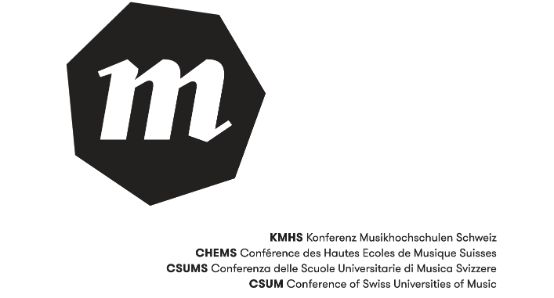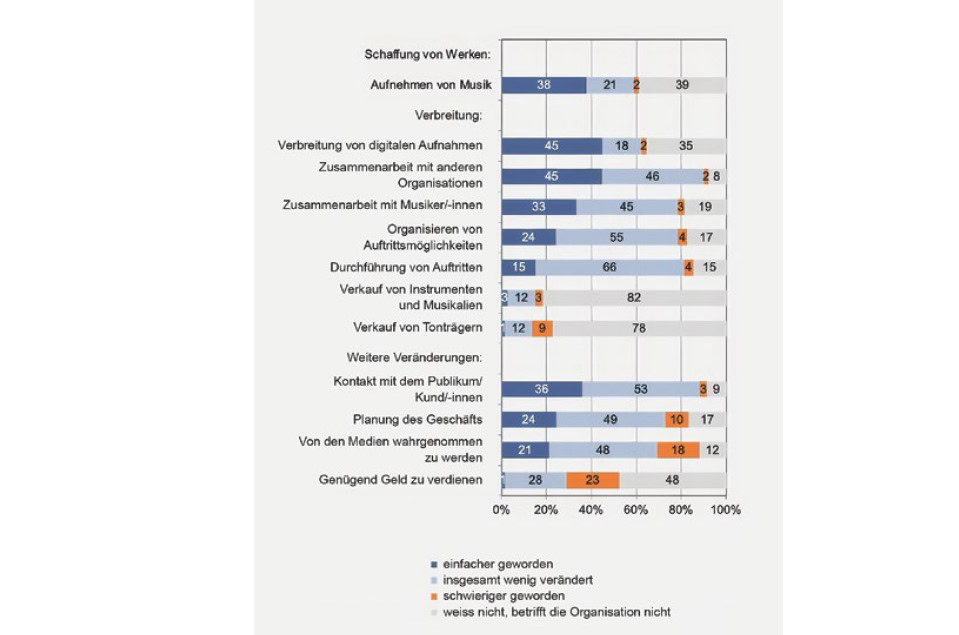Annual meeting with the KMHS President
In this issue, we would like to look back on the past year with our President Stephan Schmidt and venture a look ahead.

MvO - Stephan Schmidt has held a dual mandate as Director of the FHNW Academy of Music and the Basel Music Academy since 2012. He has been President of the KMHS since 2017.
Stephan Schmidt, when we last spoke in 2017, you mentioned the implementation of Article 67a of the Constitution as an important challenge for the KMHS. What has happened so far?
The implementation of the constitutional article is currently still unsatisfactory. As part of the consultation process for the new 2021-2024 cultural dispatch, we described the implementation to date as "mixed", but we note that the Federal Council seems willing to develop further elements of music promotion, albeit not yet to the extent that would be necessary. In our view, it is particularly urgent to finally create a clear legal basis and funding for the promotion of talented students (including PreCollege).
At the time, it was important to you to educate politicians and society more and better about the realities of the music profession. Has this been more successful in the meantime?
This is certainly an ongoing process, and each conservatoire is individually challenged in its location. Our task of creating acceptance for the music profession permeates all of our areas of activity, especially with regard to "hot potatoes" such as the necessary expansion of low-threshold access to music promotion, the need for musical and pedagogical excellence, the long-term task of making the fundamental internationality and requirements of the music profession understandable and, last but not least, making the profile of teachers mandatory.
What is the status of the Higher Education Funding and Coordination Act (HFKG), which has been in force since January 1, 2015 and has created a uniform legal higher education area for universities, universities of teacher education and universities of applied sciences (with music)? How would you assess this?
Looking back at the development from the municipal/cantonal conservatories to the universities on the basis of the HFKG, it is clear that the development has been positive overall. Thanks to the law, the performance mandate of the conservatoires is based on a stable and sustainable legal basis, which was not the case in the past, and allows for new freedoms and possibilities with regard to the educational system in the long term. At the same time, however, it must also be said that the Swiss solution of subordinating the artistic conservatoires to the type of university of applied sciences is an exception that is difficult to communicate internationally and, in conjunction with the integration into superordinate large university of applied sciences clusters, has also brought disadvantages: many decisions affecting our work are made at higher levels, and it is now more difficult than before for the music sector to make its voice heard in good time as a specialist conference or to influence such decisions. This is because, for example, the KMHS is no longer a direct point of contact for consultations, but only the large higher-level universities of applied sciences as a whole are involved. In future, the KMHS will have to further clarify and sharpen its role as a specialist conference.
From your perspective as KMHS President, what was a highlight of the past year?
Clearly the constructive collaboration with the Swiss Association of Music Schools (vms) and the establishment and anchoring of the PreCollege label. This seems to me to have been very successful, and I see it as a clear strengthening of the music colleges, as well as the VMS, because this cooperation results in meaningful and sustainable developments.
And your personal, musical one?
When I look back on 2019, I'm surprised to see that there were indeed a few highlights, even though I can't be very active artistically at the moment: January saw the new edition and first performance of Alfred Wälchli's "Ballata des Oscen" (1985) in its original version for solo guitar, which was the result of a research project; then I had the pleasure of playing along with Mats Scheidegger in Helmut Lachenmann's "my melodies" with the Berliner Philharmoniker under Simon Rattle, followed by the world premiere of a microtonal composition for guitar by Matthias S. Krüger in Tallinn with a specially built guitar, the performance of Anton Webern's three songs op. 18 with Sarah Maria Sun and Kilian Herold. Finally, I would like to mention the performance and recording of Franz Schubert's Arpeggione Sonata, which I enjoyed performing together with the cellist Christoph Dangel on a specially built copy of a 10-string instrument by Johann Georg Stauffer from around 1823.
What are the key milestones for Swiss music universities this year and in the years to come?
Major challenges always require continuous thematization and discussion over a longer period of time. Currently, these include topics such as the urgent need for nationwide recognition of music mono-subject training in elementary school, which unfortunately only exists in a few cantons at the moment.
Another topical issue is the discussion launched at all universities about the balance between professionalism and interdisciplinarity, which represents quite a challenge for our fairly traditional courses. We are finding that questions about individual and sustainable job profiles are penetrating deep into our study structures and that we need to find answers to demands for additional skills, openness and flexibility in the study structure as well as interdisciplinary connectivity.
Since we are not only supported by our society, but are also part of it, the question naturally arises as to what relevance our work has in society ... it is clear to me that an isolated view of the role of music academies and their forms of education is no longer appropriate.
From a KMHS perspective, how have your expectations regarding the PreCollege been met and where do you still see room for improvement?
In the meantime, the PreCollege has been established as a label and the cooperation with the VMS - as already mentioned - is working very well. However, improvements are needed on the legal side. In connection with this, we will continue to press ahead with the issue of financing this pre-college program.
A new campus will open in Lucerne this year. What does a new building like this mean for the image of music universities in Switzerland?
New buildings are always positive signals of development both internally and externally, opening up new dynamics and thus representing a challenge, risk and opportunity at the same time. Of course, we are all primarily concerned with the content of the training, but this is precisely why the demands on buildings and infrastructure have changed so much in recent years, and it is becoming clear that the classic conservatory buildings, for example, are struggling to meet these new requirements and therefore need to be further developed with new concepts or even replaced. This interesting development will certainly continue at other locations...
Switzerland is always in the spotlight when it comes to European integration. How do you assess the situation of Swiss music academies in a European and global comparison?
In my view, Swiss music universities are in a good position and are very attractive to students. They benefit from and at the same time suffer from the geopolitical situation, as do other institutions - precisely because we have to be primarily internationally oriented institutions. Exclusion and marginalization of any kind make no sense in the music profession, which has been internationalized for thousands of years.
In certain respects, there is even a danger that the music universities in neighboring countries will be able to develop better. For example, I consider the fact that Swiss music universities cannot offer their own third cycle to be a significant and lasting weakening of Switzerland as a university location. It is up to politicians to find better solutions than the current ones so that our country does not miss the boat. Unfortunately, however, the current signals from politicians are not very promising.
We sense that these questions are rapidly gaining in importance.
At the Basel Music Academy/University of Music FHNW, an interdisciplinary working group of students and teaching staff spontaneously formed last semester, which has since contacted the management and is asking clear questions about sustainability and possible improvement measures. The music scene in particular not only feels the ecological relevance, but also the economic relevance that directly affects it. So something is happening, students and lecturers are alert, and that makes me very happy. At the same time, of course, there are major challenges as to which of the many ideas really make sense and can be implemented within a reasonable period of time.
The year 2020 is still young: what do you think are the highlights of this year's conservatoire year?
This year, possibly in 2021, it is expected that all music universities in Switzerland will be institutionally accredited via the HEdA, which is a significant step from an institutional perspective and very pleasing. This will lead to a professionalization of the institutions, but also to more work, which will require new forms of organization and job profiles.
Artistic and educational highlights, which give us meaning and inspiration, carry us with their wings over all institutional issues...
... and then the ELIA Biennial Conference will take place in Zurich in November. What can we expect from this?
Issues such as the balance between disciplinarity, interdisciplinarity and connectivity are burning and central topics for the coming years. The ELIA conference can therefore be a very interesting platform not only to address these topics, but also to drive them forward, which is why the ZHdK seems to me to be a very suitable venue.
The motto of the conference is "Expanding the Arts", and in this respect is perhaps intended to develop from within, while the question of connectivity is an overarching one to which we must pay a great deal of attention in the future.








